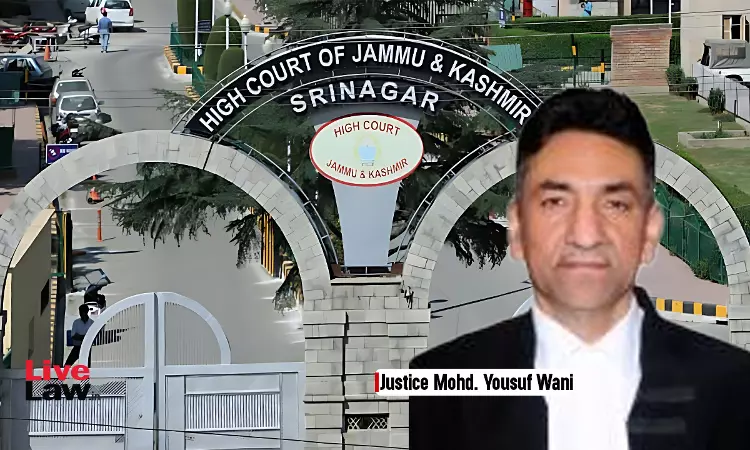- Home
- /
- High Courts
- /
- High Court of J & K and Ladakh
- /
- S.142 NI Act | No Bar On...
S.142 NI Act | No Bar On Magistrates From Adhering To Pre-Cognisance Notice Requirements U/S 223 Of BNSS: J&K High Court Clarifies
LIVELAW NEWS NETWORK
8 May 2025 10:30 AM IST
The Jammu and Kashmir and Ladakh High Court has clarified that the provisions of Section 142 of the Negotiable Instruments Act, 1881 (N.I. Act) do not bar Magistrates from adhering to the pre-cognizance notice requirements under Section 223 of the Bharatiya Nagrik Suraksha Sanhita (BNSS).A bench of Justice Mohammad Yousuf Wani emphasized that while the N.I. Act mandates specific procedures...
The Jammu and Kashmir and Ladakh High Court has clarified that the provisions of Section 142 of the Negotiable Instruments Act, 1881 (N.I. Act) do not bar Magistrates from adhering to the pre-cognizance notice requirements under Section 223 of the Bharatiya Nagrik Suraksha Sanhita (BNSS).
A bench of Justice Mohammad Yousuf Wani emphasized that while the N.I. Act mandates specific procedures for complaints under Section 138 (cheque dishonour), the issuance of pre-cognizance notices to the accused under BNSS remains permissible and "justice-oriented."
“Since, the remedy for an offence under Section 138 of the Act is a complaint, as referred to under Section 142 of the Act, therefore, the observance of the requirements as mentioned under Section 223 BNSS regarding examination of the complainant/payee and the witnesses present on oath as also the issuance of the pre-cognizance notice introduced by the new legislation, is not at all barred but desired in respect of a complaint filed under Section 138 of the Act”, the court accentuated.
The ruling came while disposing of a petition challenging the issuance of a non-bailable warrant against the petitioner in a cheque bounce case.
The petitioner, Mohd Afzal Beigh, had approached the High Court seeking quashing of orders passed by the Judicial Magistrate (Munsiff), Kishtwar. The Magistrate had directed the issuance of a pre-cognizance notice and later a non-bailable warrant against Beigh in a complaint filed by respondent Noor Hussain under Section 138 of the N.I. Act.
Petitioner's Counsel M Nadeem Bhat argued that the Magistrate erred by issuing a pre-cognizance notice and a non-bailable warrant, as Section 142 of the N.I. Act strictly mandates that cognizance can only be taken upon a written complaint by the payee, without requiring pre-cognizance steps under BNSS. He stressed that the Magistrate failed to verify whether the complaint met the conditions under the proviso to Section 138 and Section 142 of the N.I. Act before proceeding.
Court's Observations:
Interpreting the mandate of Section 142 N.I. Act the Court noted that Section 142 begins with a "Non-obstante" clause, overriding the general CrPC/BNSS procedures. However, it only bars cognizance based on police reports (not complaints) and mandates a written complaint by the payee within one month of the cause of action. The Court clarified that this does not exclude the Magistrate's discretion to issue pre-cognizance notices under Section 223 BNSS, which aids in assessing the accused's defence early.
Justice Wani held that the Magistrate's issuance of a pre-cognizance notice was not illegal, as Section 223 BNSS (introduced newly) is "justice-oriented" and complements the N.I. Act framework.
It added,
“Section 223 BNSS provides for issuance of pre-cognizance notice to the accused and said provision was not available in the corresponding Section 200 of the repealed Code. Such requirement provided under Section 223 of the BNSS by way of proviso appear to be justice orientated as the same takes care of any legitimate defence of the accused to be appreciated by the Magistrate even at an earliest, while holding a preliminary inquiry and is not barred at all even in respect of complaints under N.I.Act as hereinabove discussed”
However, the court also explained that the non-observance of the requirements, provided under Section 223 BNSS, regarding the examination on oath of the complainant/witnesses and the issuance of the pre-cognizance notice shall not render the proceedings invalid.
Commenting on the issuance of the warrant by the Court below the court said that the action was excessive, as the accused could have been summoned through milder measures like bailable warrants.
The Court elaborated on Section 143 of the N.I. Act, which prescribes summary trials for cheque bounce cases but allows Magistrates to switch to summons trial procedures if the case complexity demands. It emphasized that Magistrates should record reasons for such shifts and ensure expeditious disposal, ideally within six months.
Highlighting the civil wrong underlying Section 138, the Court reiterated that the offence is compoundable and urged Magistrates to encourage mediation or Lok Adalat settlements to reduce pendency, without causing undue delay.
“The complaints under Sections 138 and 141 of the Negotiable Instruments Act need to be treated as priority sector litigation and tried expeditiously as per the mandate of the Act. The competent jurisdictional Courts are expected to make every endeavor that the cheque bounce cases are disposed of expeditiously”, the court remarked.
In view of these observations the High Court set aside the non-bailable warrant but directed the petitioner to appear before the Magistrate for further proceedings.
“A copy of this order be forwarded to the learned Registrar General of this Court with a request for its circulation among the Judicial Magistrates working in the District Judiciary in the Union Territories of the Jammu and Kashmir/Ladakh”, the court concluded.
Case Title: Mohd Afzal Beigh Vs Noor Hussain
Citation: 2025 LiveLaw (JKL) 177



